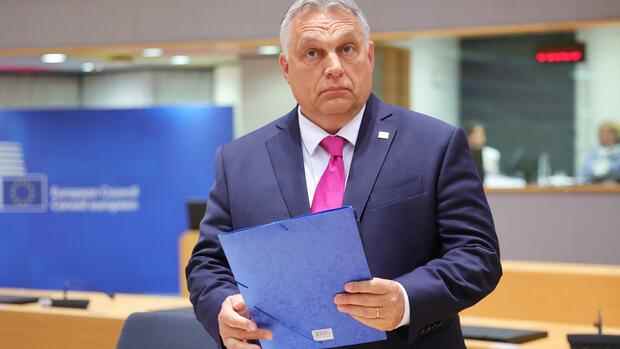According to the will of the other EU states, Patriarch Kirill should be included on the EU sanctions list because of his support for the Russian war of aggression against Ukraine.
(Photo: AP)
Brussels Hungary is demanding further changes to the new EU sanctions package against Russia, thereby again blocking its entry into force. Specifically, the country is calling for the planned punitive measures against the Russian Orthodox Church leader, Patriarch Kirill, to be abandoned, as several diplomats from the German Press Agency confirmed on Wednesday evening.
The EU’s plan was actually to finally get the decision-making process for the sixth package of sanctions underway this Wednesday. Earlier on Tuesday night, after weeks of arguments, an agreement was reached at a summit meeting over the oil embargo that was also planned. Hungary prevailed that oil deliveries by pipeline are initially exempt from the import ban.
According to the will of the other EU states, Patriarch Kirill should be included on the EU sanctions list because of his support for the Russian war of aggression against Ukraine. Kirill maintains close contact with President Vladimir Putin and has so far shown himself to be very loyal to the Kremlin. In his sermons, the 75-year-old repeatedly supported the war policy and recently even claimed that Russia had never attacked another country. The head of the Catholic Church, Pope Francis, recently canceled a planned meeting with Kirill.
Specifically, sanctions against Kirill would mean that the cleric would no longer be allowed to enter the EU. In addition, assets that he may have in the EU would have to be frozen.
Top jobs of the day
Find the best jobs now and
be notified by email.
According to diplomats, the planned sanctions against Kirill were not discussed at the EU summit on Monday and Tuesday. However, Orban had already expressed his rejection in a radio interview at the beginning of May. “Hungary will not consent to church leaders being treated in such a manner,” he said at the time. “For reasons of principle, this is an even more important issue than the oil embargo.”
Specifically, sanctions against Kirill would mean that the cleric would no longer be allowed to enter the EU.
(Photo: IMAGO/ITAR-TASS)
The Hungarian State Secretary Tristan Azbej, responsible for the “persecuted Christians in the world”, explained a little later on the Hungarian attitude: “The Russian Orthodox Church has 160 million believers and 40,000 priests worldwide. The “completely crazy” idea of the EU Commission would even forbid the Orthodox Church leader to enter the territory of the EU, that is, isolate the believers living there from their religious leader. This idea is harmful, it does not lead to reconciliation.”
Attempted agreement on Thursday?
According to EU figures, there are hardly any followers of the Russian Orthodox Church in Hungary itself. The vast majority of believers are therefore Catholic.
How the dispute could be resolved was initially unclear on Wednesday evening. According to diplomats, further talks and a new attempt at agreement could take place this Thursday on the sidelines of an EU ministerial meeting in Luxembourg.
In addition to the oil embargo and sanctions against the patriarch, the EU’s sixth major sanctions package against Russia is said to contain numerous other measures. Thus, it is planned to exclude the largest Russian bank, Sberbank, from the Swift financial communications network. In addition, several Russian news channels are to be banned in the EU.
The boycott against oil deliveries from Russia, which is particularly relevant from an economic point of view, stipulates that no more oil will be allowed into the EU by sea in the coming year. Only Hungary, Slovakia and the Czech Republic will be allowed to import Russian oil via the Druzhba pipeline until further notice because of their high level of dependence.
According to Commission President Ursula von der Leyen, the EU will purchase around 90 percent less oil from Russia by the end of the year, despite the exception for pipeline deliveries. According to estimates by the EU think tank Bruegel, until recently, EU countries spent around 450 million euros a day on oil from Russia and 400 million euros on gas.
More: Why the EU’s oil embargo against Russia could come to nothing

